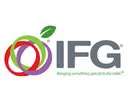Table grape breeder International Fruit Genetics (IFG), which boasts 48 patented table grape varieties and 10 patented sweet cherry varieties, has completed its digital transformation.
IFG collects vast amounts of data that can now be summarized and consolidated to aid decision-making for IFG and its licensees. In 2019, IFG first launched the project to consolidate critical data to develop a more integrated system and has since expanded that foundation by linking numerous internal and external applications including the use of artificial intelligence. This allows IFG to provide better recommendations, make more informed decisions for both existing fruit varieties and licensees.
 “The automation of IFG systems and data collection methods provides a myriad of benefits,” said Carol Higgins, solutions architect/manager IT, IFG. “The three IFG licensee support pillars of Commercial, Quality and Technical contribute to and utilize the extensive data collected. The IFG team’s advice is shared throughout the supply chain, ranging from the field to harvest, packaging and sales.”
“The automation of IFG systems and data collection methods provides a myriad of benefits,” said Carol Higgins, solutions architect/manager IT, IFG. “The three IFG licensee support pillars of Commercial, Quality and Technical contribute to and utilize the extensive data collected. The IFG team’s advice is shared throughout the supply chain, ranging from the field to harvest, packaging and sales.”
IFG’s business model – renting its varieties and trademarks rather than selling them – allows it to engage with licensees and the marketplace annually. The data collected are extensive and provide invaluable insight when consolidated and anonymized.
Higgins wanted to ensure everyone was using the same tools to take notes in the field – these readings are critical for providing advice to growers in vastly different regions. Higgins armed the IFG staff with more sophisticated solutions, such as globally standardized tools that can work offline to gather data and the development of an internal database to store and analyze the information collected. Prior efforts to collect data ranged from spreadsheets to the paper and pencil method.
One main goal was to streamline IFG’s data quantities, allowing historical and recent data to be utilized for research and reporting to provide licensees with a snapshot of their performance in the marketplace.
Additionally, the new data strategy has been a windfall for the IFG research and development team engaged in the natural breeding processes to develop new varieties of table grapes and sweet cherries.
“We have tens of thousands of new seedlings every year. The ability to sequence the genome of virtually all individuals of our breeding populations has helped create amazing new opportunities in breeding,” said Dr. Chris Owens, lead plant breeder.
The new technologies and systems allow IFG to better manage a vast portfolio of intellectual property assets. This enables executives to know where every plant is being grown and produced throughout the globe, aiding in IFG’s IP protection and the rights of the licensees who grow IFG fruits.
“Because of this transformation, IFG has insights across many markets that can be used to show licensees how to improve and be more successful in their plantings and to have more confidence that their planting decisions will meet their market and profit objectives,” said Andy Higgins, CEO of IFG.
 For more information:
For more information:
Michele Nachum
IFG
Tel: +1 (425) 698-7477
michelen@bastionagency.com
www.ifg.world
